Ethics Research Report: Marketing and Market Research
VerifiedAdded on 2020/01/23
|8
|2717
|71
Report
AI Summary
This report examines the critical role of ethics and codes of conduct in the marketing and market research professions. It explores the importance of ethical guidelines in the workplace, emphasizing how these principles guide behavior, define responsibilities, and shape professional conduct. The report delves into ethical and unethical behaviors specific to marketing and market research, contrasting the codes of ethics within these professions. It highlights examples of ethical practices such as transparency and honesty, while also exposing unethical behaviors like misleading advertising and data falsification. The study underscores the similarities and differences in ethical considerations between the two fields, emphasizing the impact of ethical conduct on brand image, customer trust, and long-term success. The report concludes by stressing the necessity of adhering to ethical standards to maintain professional integrity and foster positive relationships with clients and stakeholders.
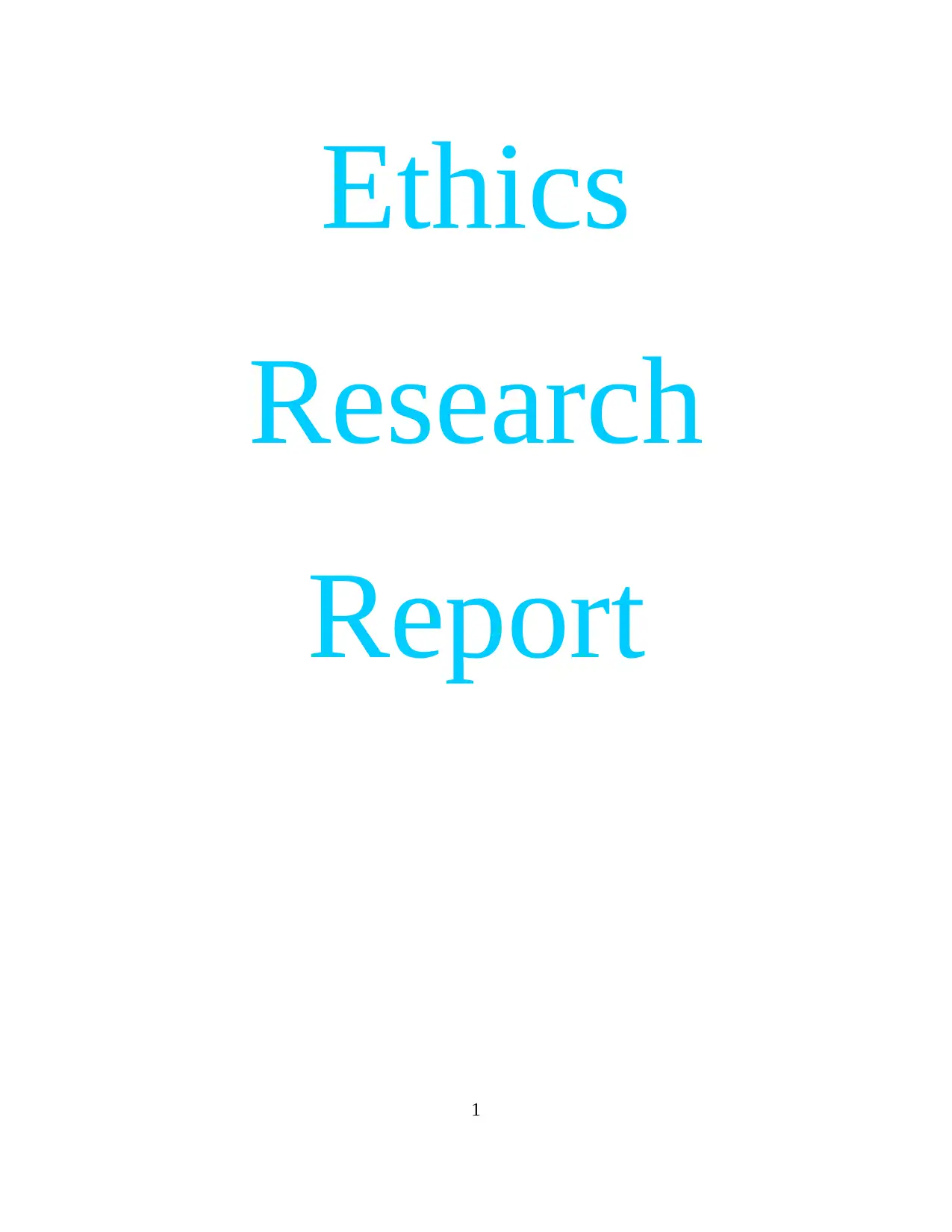
Ethics
Research
Report
1
Research
Report
1
Paraphrase This Document
Need a fresh take? Get an instant paraphrase of this document with our AI Paraphraser
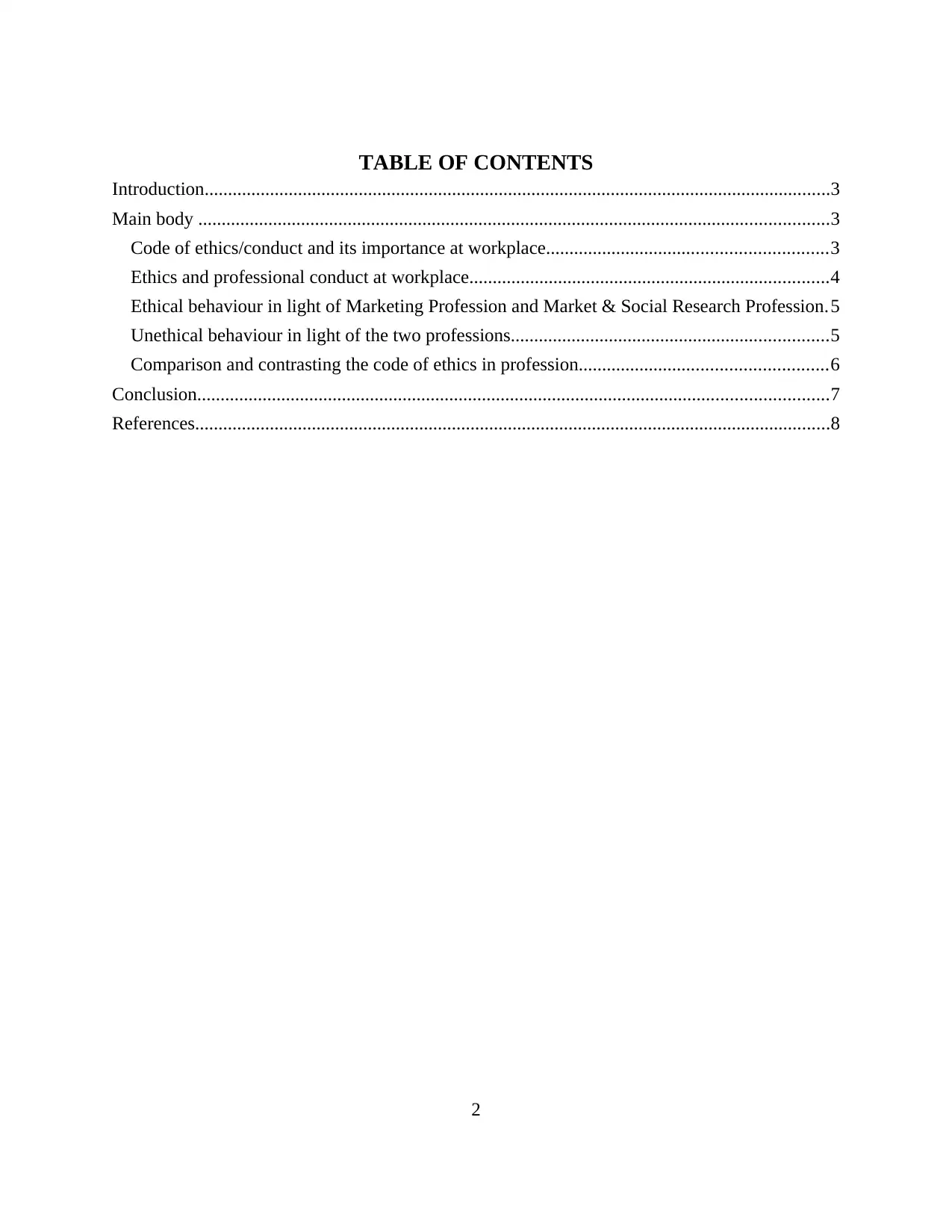
TABLE OF CONTENTS
Introduction......................................................................................................................................3
Main body .......................................................................................................................................3
Code of ethics/conduct and its importance at workplace............................................................3
Ethics and professional conduct at workplace.............................................................................4
Ethical behaviour in light of Marketing Profession and Market & Social Research Profession.5
Unethical behaviour in light of the two professions....................................................................5
Comparison and contrasting the code of ethics in profession.....................................................6
Conclusion.......................................................................................................................................7
References........................................................................................................................................8
2
Introduction......................................................................................................................................3
Main body .......................................................................................................................................3
Code of ethics/conduct and its importance at workplace............................................................3
Ethics and professional conduct at workplace.............................................................................4
Ethical behaviour in light of Marketing Profession and Market & Social Research Profession.5
Unethical behaviour in light of the two professions....................................................................5
Comparison and contrasting the code of ethics in profession.....................................................6
Conclusion.......................................................................................................................................7
References........................................................................................................................................8
2
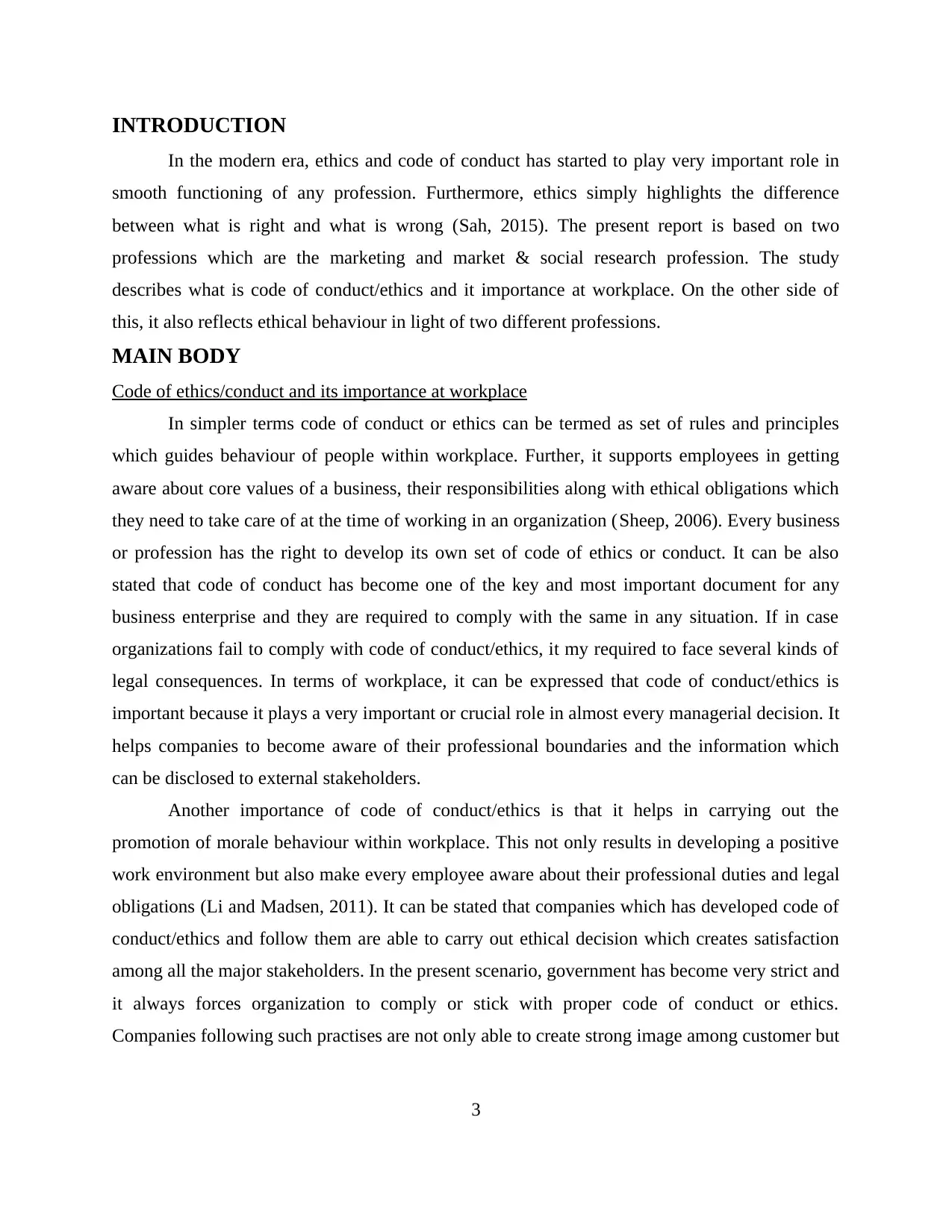
INTRODUCTION
In the modern era, ethics and code of conduct has started to play very important role in
smooth functioning of any profession. Furthermore, ethics simply highlights the difference
between what is right and what is wrong (Sah, 2015). The present report is based on two
professions which are the marketing and market & social research profession. The study
describes what is code of conduct/ethics and it importance at workplace. On the other side of
this, it also reflects ethical behaviour in light of two different professions.
MAIN BODY
Code of ethics/conduct and its importance at workplace
In simpler terms code of conduct or ethics can be termed as set of rules and principles
which guides behaviour of people within workplace. Further, it supports employees in getting
aware about core values of a business, their responsibilities along with ethical obligations which
they need to take care of at the time of working in an organization (Sheep, 2006). Every business
or profession has the right to develop its own set of code of ethics or conduct. It can be also
stated that code of conduct has become one of the key and most important document for any
business enterprise and they are required to comply with the same in any situation. If in case
organizations fail to comply with code of conduct/ethics, it my required to face several kinds of
legal consequences. In terms of workplace, it can be expressed that code of conduct/ethics is
important because it plays a very important or crucial role in almost every managerial decision. It
helps companies to become aware of their professional boundaries and the information which
can be disclosed to external stakeholders.
Another importance of code of conduct/ethics is that it helps in carrying out the
promotion of morale behaviour within workplace. This not only results in developing a positive
work environment but also make every employee aware about their professional duties and legal
obligations (Li and Madsen, 2011). It can be stated that companies which has developed code of
conduct/ethics and follow them are able to carry out ethical decision which creates satisfaction
among all the major stakeholders. In the present scenario, government has become very strict and
it always forces organization to comply or stick with proper code of conduct or ethics.
Companies following such practises are not only able to create strong image among customer but
3
In the modern era, ethics and code of conduct has started to play very important role in
smooth functioning of any profession. Furthermore, ethics simply highlights the difference
between what is right and what is wrong (Sah, 2015). The present report is based on two
professions which are the marketing and market & social research profession. The study
describes what is code of conduct/ethics and it importance at workplace. On the other side of
this, it also reflects ethical behaviour in light of two different professions.
MAIN BODY
Code of ethics/conduct and its importance at workplace
In simpler terms code of conduct or ethics can be termed as set of rules and principles
which guides behaviour of people within workplace. Further, it supports employees in getting
aware about core values of a business, their responsibilities along with ethical obligations which
they need to take care of at the time of working in an organization (Sheep, 2006). Every business
or profession has the right to develop its own set of code of ethics or conduct. It can be also
stated that code of conduct has become one of the key and most important document for any
business enterprise and they are required to comply with the same in any situation. If in case
organizations fail to comply with code of conduct/ethics, it my required to face several kinds of
legal consequences. In terms of workplace, it can be expressed that code of conduct/ethics is
important because it plays a very important or crucial role in almost every managerial decision. It
helps companies to become aware of their professional boundaries and the information which
can be disclosed to external stakeholders.
Another importance of code of conduct/ethics is that it helps in carrying out the
promotion of morale behaviour within workplace. This not only results in developing a positive
work environment but also make every employee aware about their professional duties and legal
obligations (Li and Madsen, 2011). It can be stated that companies which has developed code of
conduct/ethics and follow them are able to carry out ethical decision which creates satisfaction
among all the major stakeholders. In the present scenario, government has become very strict and
it always forces organization to comply or stick with proper code of conduct or ethics.
Companies following such practises are not only able to create strong image among customer but
3
⊘ This is a preview!⊘
Do you want full access?
Subscribe today to unlock all pages.

Trusted by 1+ million students worldwide
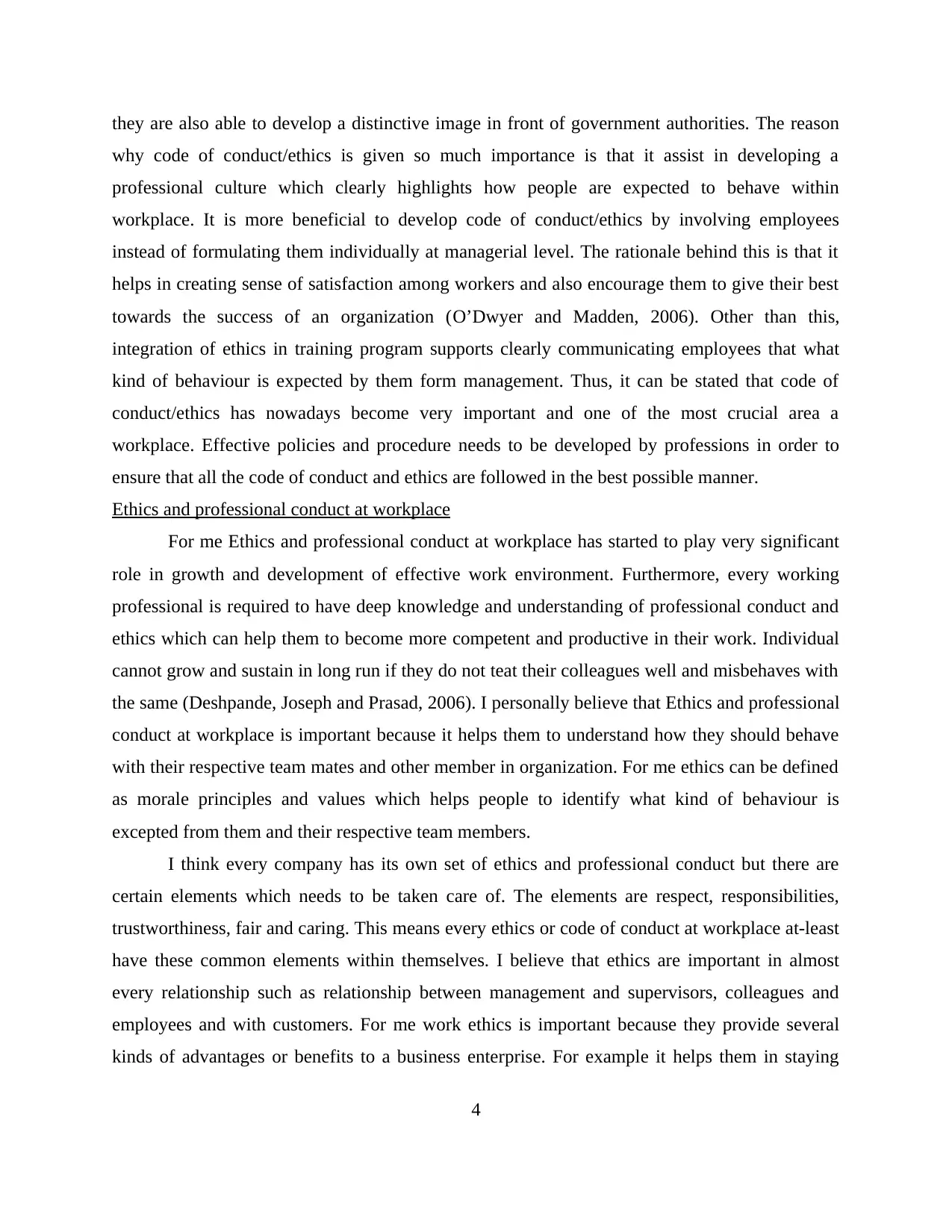
they are also able to develop a distinctive image in front of government authorities. The reason
why code of conduct/ethics is given so much importance is that it assist in developing a
professional culture which clearly highlights how people are expected to behave within
workplace. It is more beneficial to develop code of conduct/ethics by involving employees
instead of formulating them individually at managerial level. The rationale behind this is that it
helps in creating sense of satisfaction among workers and also encourage them to give their best
towards the success of an organization (O’Dwyer and Madden, 2006). Other than this,
integration of ethics in training program supports clearly communicating employees that what
kind of behaviour is expected by them form management. Thus, it can be stated that code of
conduct/ethics has nowadays become very important and one of the most crucial area a
workplace. Effective policies and procedure needs to be developed by professions in order to
ensure that all the code of conduct and ethics are followed in the best possible manner.
Ethics and professional conduct at workplace
For me Ethics and professional conduct at workplace has started to play very significant
role in growth and development of effective work environment. Furthermore, every working
professional is required to have deep knowledge and understanding of professional conduct and
ethics which can help them to become more competent and productive in their work. Individual
cannot grow and sustain in long run if they do not teat their colleagues well and misbehaves with
the same (Deshpande, Joseph and Prasad, 2006). I personally believe that Ethics and professional
conduct at workplace is important because it helps them to understand how they should behave
with their respective team mates and other member in organization. For me ethics can be defined
as morale principles and values which helps people to identify what kind of behaviour is
excepted from them and their respective team members.
I think every company has its own set of ethics and professional conduct but there are
certain elements which needs to be taken care of. The elements are respect, responsibilities,
trustworthiness, fair and caring. This means every ethics or code of conduct at workplace at-least
have these common elements within themselves. I believe that ethics are important in almost
every relationship such as relationship between management and supervisors, colleagues and
employees and with customers. For me work ethics is important because they provide several
kinds of advantages or benefits to a business enterprise. For example it helps them in staying
4
why code of conduct/ethics is given so much importance is that it assist in developing a
professional culture which clearly highlights how people are expected to behave within
workplace. It is more beneficial to develop code of conduct/ethics by involving employees
instead of formulating them individually at managerial level. The rationale behind this is that it
helps in creating sense of satisfaction among workers and also encourage them to give their best
towards the success of an organization (O’Dwyer and Madden, 2006). Other than this,
integration of ethics in training program supports clearly communicating employees that what
kind of behaviour is expected by them form management. Thus, it can be stated that code of
conduct/ethics has nowadays become very important and one of the most crucial area a
workplace. Effective policies and procedure needs to be developed by professions in order to
ensure that all the code of conduct and ethics are followed in the best possible manner.
Ethics and professional conduct at workplace
For me Ethics and professional conduct at workplace has started to play very significant
role in growth and development of effective work environment. Furthermore, every working
professional is required to have deep knowledge and understanding of professional conduct and
ethics which can help them to become more competent and productive in their work. Individual
cannot grow and sustain in long run if they do not teat their colleagues well and misbehaves with
the same (Deshpande, Joseph and Prasad, 2006). I personally believe that Ethics and professional
conduct at workplace is important because it helps them to understand how they should behave
with their respective team mates and other member in organization. For me ethics can be defined
as morale principles and values which helps people to identify what kind of behaviour is
excepted from them and their respective team members.
I think every company has its own set of ethics and professional conduct but there are
certain elements which needs to be taken care of. The elements are respect, responsibilities,
trustworthiness, fair and caring. This means every ethics or code of conduct at workplace at-least
have these common elements within themselves. I believe that ethics are important in almost
every relationship such as relationship between management and supervisors, colleagues and
employees and with customers. For me work ethics is important because they provide several
kinds of advantages or benefits to a business enterprise. For example it helps them in staying
4
Paraphrase This Document
Need a fresh take? Get an instant paraphrase of this document with our AI Paraphraser
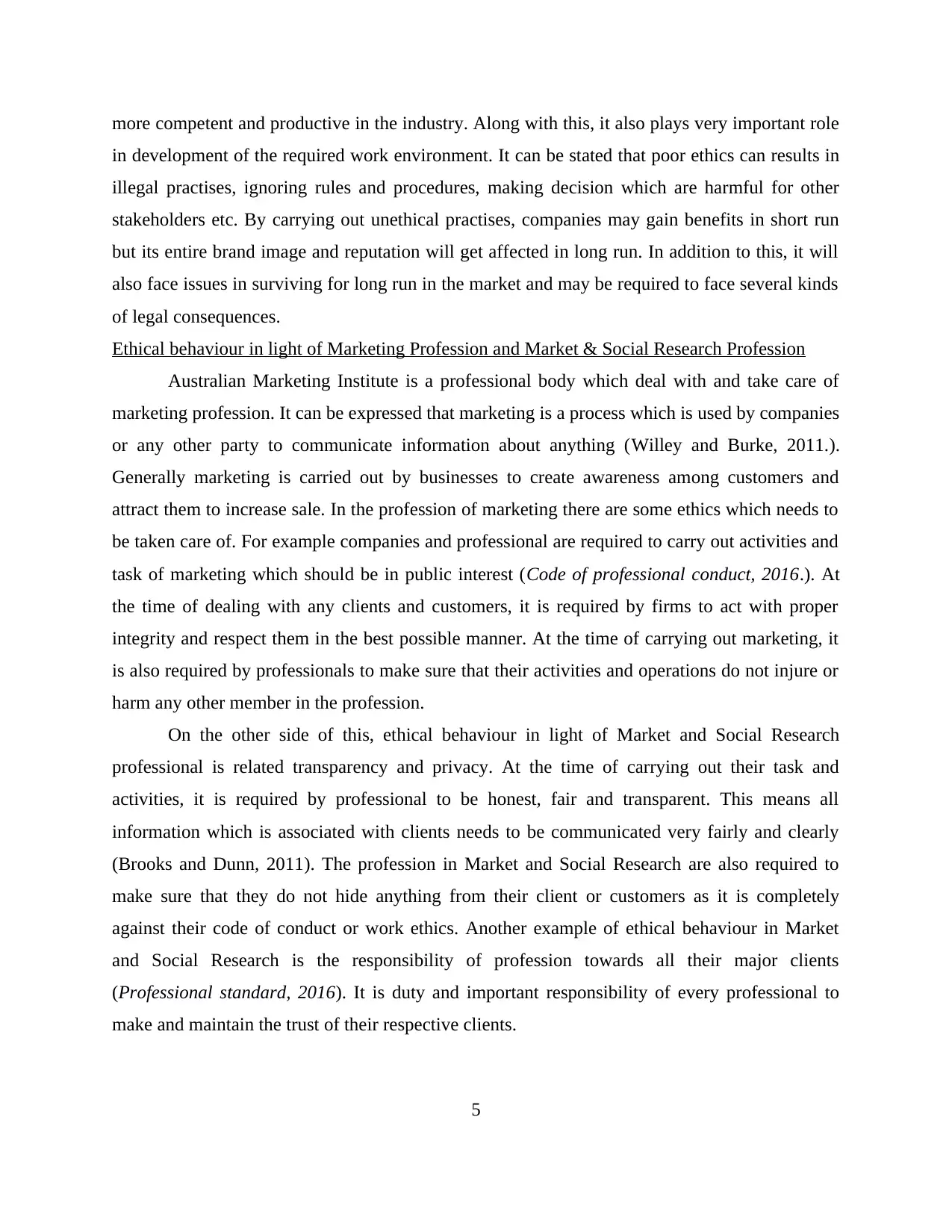
more competent and productive in the industry. Along with this, it also plays very important role
in development of the required work environment. It can be stated that poor ethics can results in
illegal practises, ignoring rules and procedures, making decision which are harmful for other
stakeholders etc. By carrying out unethical practises, companies may gain benefits in short run
but its entire brand image and reputation will get affected in long run. In addition to this, it will
also face issues in surviving for long run in the market and may be required to face several kinds
of legal consequences.
Ethical behaviour in light of Marketing Profession and Market & Social Research Profession
Australian Marketing Institute is a professional body which deal with and take care of
marketing profession. It can be expressed that marketing is a process which is used by companies
or any other party to communicate information about anything (Willey and Burke, 2011.).
Generally marketing is carried out by businesses to create awareness among customers and
attract them to increase sale. In the profession of marketing there are some ethics which needs to
be taken care of. For example companies and professional are required to carry out activities and
task of marketing which should be in public interest (Code of professional conduct, 2016.). At
the time of dealing with any clients and customers, it is required by firms to act with proper
integrity and respect them in the best possible manner. At the time of carrying out marketing, it
is also required by professionals to make sure that their activities and operations do not injure or
harm any other member in the profession.
On the other side of this, ethical behaviour in light of Market and Social Research
professional is related transparency and privacy. At the time of carrying out their task and
activities, it is required by professional to be honest, fair and transparent. This means all
information which is associated with clients needs to be communicated very fairly and clearly
(Brooks and Dunn, 2011). The profession in Market and Social Research are also required to
make sure that they do not hide anything from their client or customers as it is completely
against their code of conduct or work ethics. Another example of ethical behaviour in Market
and Social Research is the responsibility of profession towards all their major clients
(Professional standard, 2016). It is duty and important responsibility of every professional to
make and maintain the trust of their respective clients.
5
in development of the required work environment. It can be stated that poor ethics can results in
illegal practises, ignoring rules and procedures, making decision which are harmful for other
stakeholders etc. By carrying out unethical practises, companies may gain benefits in short run
but its entire brand image and reputation will get affected in long run. In addition to this, it will
also face issues in surviving for long run in the market and may be required to face several kinds
of legal consequences.
Ethical behaviour in light of Marketing Profession and Market & Social Research Profession
Australian Marketing Institute is a professional body which deal with and take care of
marketing profession. It can be expressed that marketing is a process which is used by companies
or any other party to communicate information about anything (Willey and Burke, 2011.).
Generally marketing is carried out by businesses to create awareness among customers and
attract them to increase sale. In the profession of marketing there are some ethics which needs to
be taken care of. For example companies and professional are required to carry out activities and
task of marketing which should be in public interest (Code of professional conduct, 2016.). At
the time of dealing with any clients and customers, it is required by firms to act with proper
integrity and respect them in the best possible manner. At the time of carrying out marketing, it
is also required by professionals to make sure that their activities and operations do not injure or
harm any other member in the profession.
On the other side of this, ethical behaviour in light of Market and Social Research
professional is related transparency and privacy. At the time of carrying out their task and
activities, it is required by professional to be honest, fair and transparent. This means all
information which is associated with clients needs to be communicated very fairly and clearly
(Brooks and Dunn, 2011). The profession in Market and Social Research are also required to
make sure that they do not hide anything from their client or customers as it is completely
against their code of conduct or work ethics. Another example of ethical behaviour in Market
and Social Research is the responsibility of profession towards all their major clients
(Professional standard, 2016). It is duty and important responsibility of every professional to
make and maintain the trust of their respective clients.
5
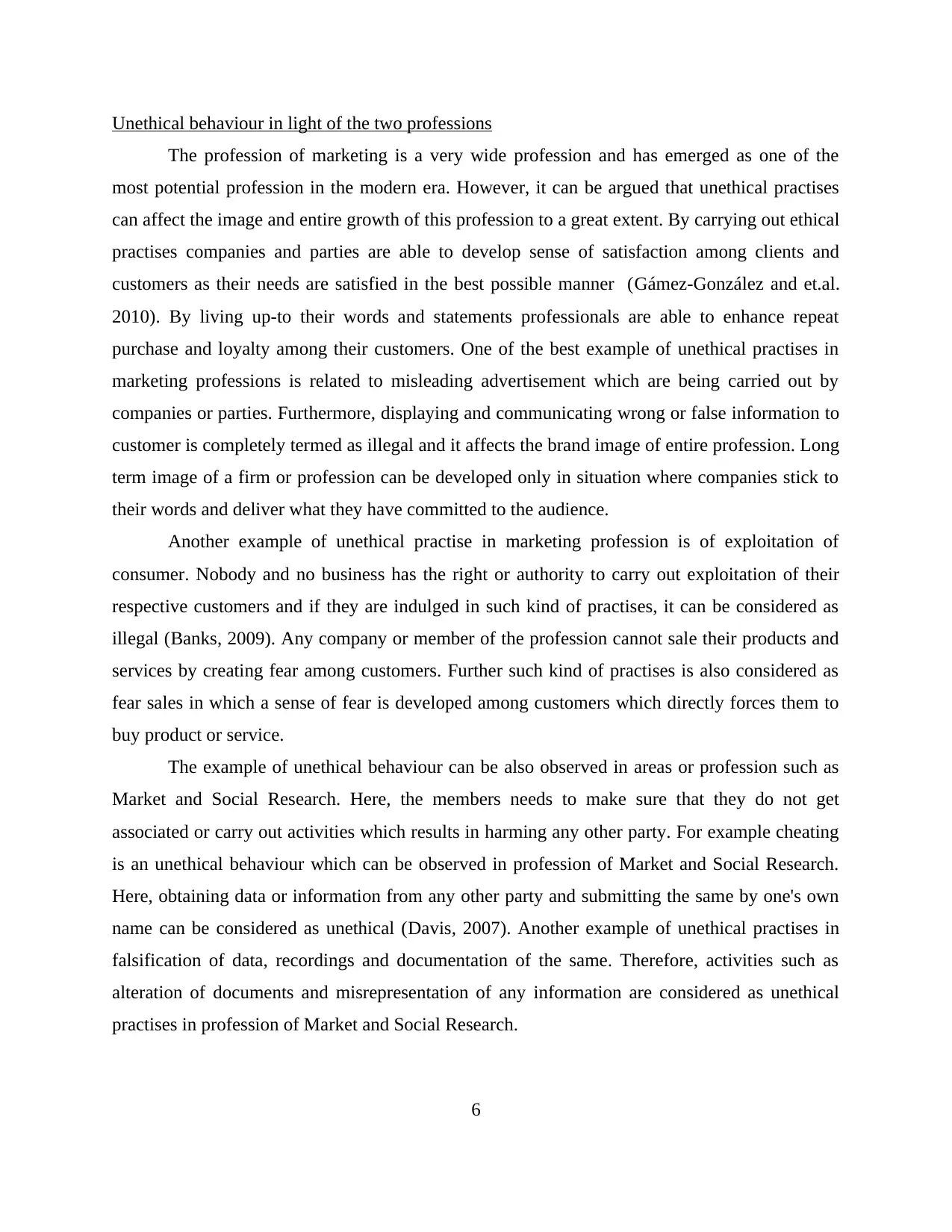
Unethical behaviour in light of the two professions
The profession of marketing is a very wide profession and has emerged as one of the
most potential profession in the modern era. However, it can be argued that unethical practises
can affect the image and entire growth of this profession to a great extent. By carrying out ethical
practises companies and parties are able to develop sense of satisfaction among clients and
customers as their needs are satisfied in the best possible manner (Gámez-González and et.al.
2010). By living up-to their words and statements professionals are able to enhance repeat
purchase and loyalty among their customers. One of the best example of unethical practises in
marketing professions is related to misleading advertisement which are being carried out by
companies or parties. Furthermore, displaying and communicating wrong or false information to
customer is completely termed as illegal and it affects the brand image of entire profession. Long
term image of a firm or profession can be developed only in situation where companies stick to
their words and deliver what they have committed to the audience.
Another example of unethical practise in marketing profession is of exploitation of
consumer. Nobody and no business has the right or authority to carry out exploitation of their
respective customers and if they are indulged in such kind of practises, it can be considered as
illegal (Banks, 2009). Any company or member of the profession cannot sale their products and
services by creating fear among customers. Further such kind of practises is also considered as
fear sales in which a sense of fear is developed among customers which directly forces them to
buy product or service.
The example of unethical behaviour can be also observed in areas or profession such as
Market and Social Research. Here, the members needs to make sure that they do not get
associated or carry out activities which results in harming any other party. For example cheating
is an unethical behaviour which can be observed in profession of Market and Social Research.
Here, obtaining data or information from any other party and submitting the same by one's own
name can be considered as unethical (Davis, 2007). Another example of unethical practises in
falsification of data, recordings and documentation of the same. Therefore, activities such as
alteration of documents and misrepresentation of any information are considered as unethical
practises in profession of Market and Social Research.
6
The profession of marketing is a very wide profession and has emerged as one of the
most potential profession in the modern era. However, it can be argued that unethical practises
can affect the image and entire growth of this profession to a great extent. By carrying out ethical
practises companies and parties are able to develop sense of satisfaction among clients and
customers as their needs are satisfied in the best possible manner (Gámez-González and et.al.
2010). By living up-to their words and statements professionals are able to enhance repeat
purchase and loyalty among their customers. One of the best example of unethical practises in
marketing professions is related to misleading advertisement which are being carried out by
companies or parties. Furthermore, displaying and communicating wrong or false information to
customer is completely termed as illegal and it affects the brand image of entire profession. Long
term image of a firm or profession can be developed only in situation where companies stick to
their words and deliver what they have committed to the audience.
Another example of unethical practise in marketing profession is of exploitation of
consumer. Nobody and no business has the right or authority to carry out exploitation of their
respective customers and if they are indulged in such kind of practises, it can be considered as
illegal (Banks, 2009). Any company or member of the profession cannot sale their products and
services by creating fear among customers. Further such kind of practises is also considered as
fear sales in which a sense of fear is developed among customers which directly forces them to
buy product or service.
The example of unethical behaviour can be also observed in areas or profession such as
Market and Social Research. Here, the members needs to make sure that they do not get
associated or carry out activities which results in harming any other party. For example cheating
is an unethical behaviour which can be observed in profession of Market and Social Research.
Here, obtaining data or information from any other party and submitting the same by one's own
name can be considered as unethical (Davis, 2007). Another example of unethical practises in
falsification of data, recordings and documentation of the same. Therefore, activities such as
alteration of documents and misrepresentation of any information are considered as unethical
practises in profession of Market and Social Research.
6
⊘ This is a preview!⊘
Do you want full access?
Subscribe today to unlock all pages.

Trusted by 1+ million students worldwide
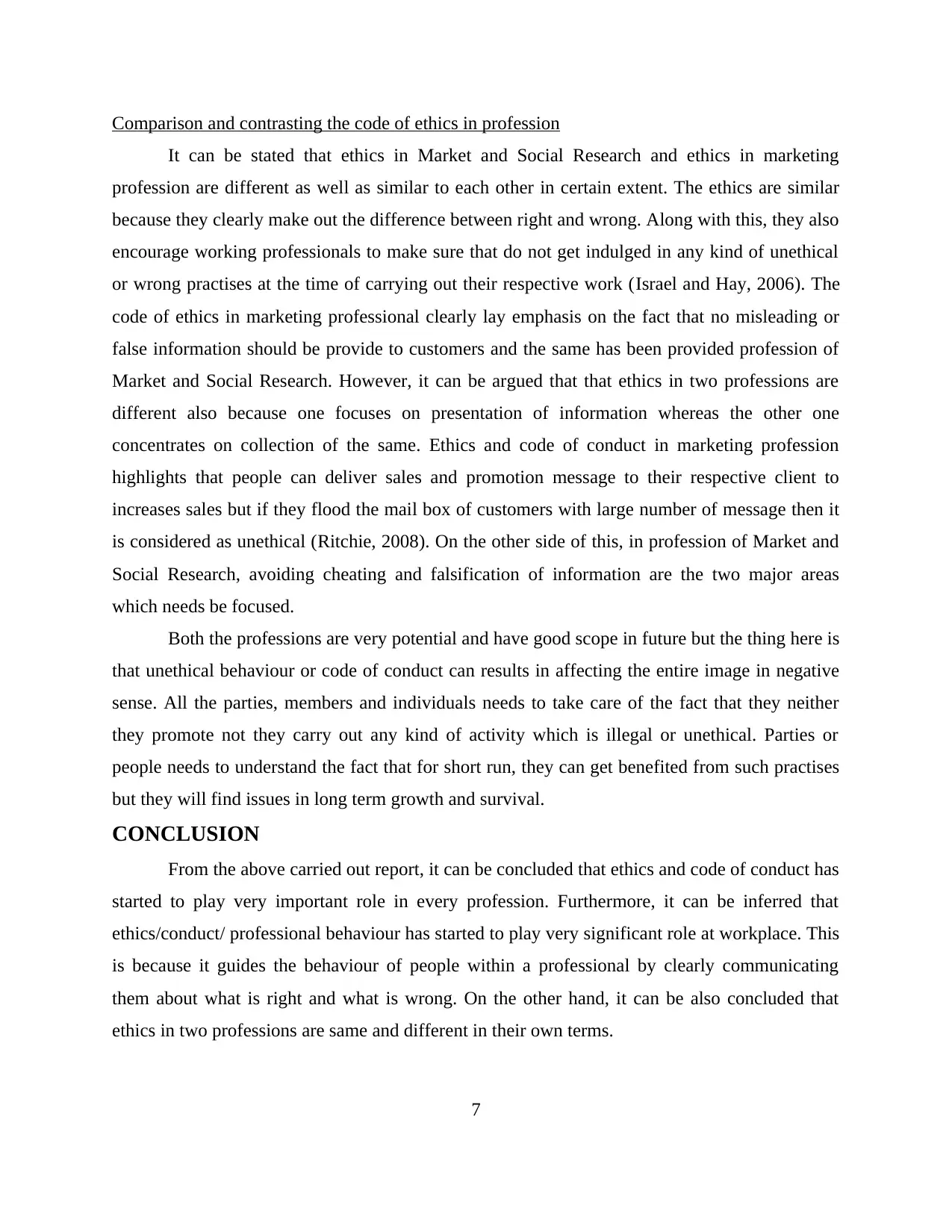
Comparison and contrasting the code of ethics in profession
It can be stated that ethics in Market and Social Research and ethics in marketing
profession are different as well as similar to each other in certain extent. The ethics are similar
because they clearly make out the difference between right and wrong. Along with this, they also
encourage working professionals to make sure that do not get indulged in any kind of unethical
or wrong practises at the time of carrying out their respective work (Israel and Hay, 2006). The
code of ethics in marketing professional clearly lay emphasis on the fact that no misleading or
false information should be provide to customers and the same has been provided profession of
Market and Social Research. However, it can be argued that that ethics in two professions are
different also because one focuses on presentation of information whereas the other one
concentrates on collection of the same. Ethics and code of conduct in marketing profession
highlights that people can deliver sales and promotion message to their respective client to
increases sales but if they flood the mail box of customers with large number of message then it
is considered as unethical (Ritchie, 2008). On the other side of this, in profession of Market and
Social Research, avoiding cheating and falsification of information are the two major areas
which needs be focused.
Both the professions are very potential and have good scope in future but the thing here is
that unethical behaviour or code of conduct can results in affecting the entire image in negative
sense. All the parties, members and individuals needs to take care of the fact that they neither
they promote not they carry out any kind of activity which is illegal or unethical. Parties or
people needs to understand the fact that for short run, they can get benefited from such practises
but they will find issues in long term growth and survival.
CONCLUSION
From the above carried out report, it can be concluded that ethics and code of conduct has
started to play very important role in every profession. Furthermore, it can be inferred that
ethics/conduct/ professional behaviour has started to play very significant role at workplace. This
is because it guides the behaviour of people within a professional by clearly communicating
them about what is right and what is wrong. On the other hand, it can be also concluded that
ethics in two professions are same and different in their own terms.
7
It can be stated that ethics in Market and Social Research and ethics in marketing
profession are different as well as similar to each other in certain extent. The ethics are similar
because they clearly make out the difference between right and wrong. Along with this, they also
encourage working professionals to make sure that do not get indulged in any kind of unethical
or wrong practises at the time of carrying out their respective work (Israel and Hay, 2006). The
code of ethics in marketing professional clearly lay emphasis on the fact that no misleading or
false information should be provide to customers and the same has been provided profession of
Market and Social Research. However, it can be argued that that ethics in two professions are
different also because one focuses on presentation of information whereas the other one
concentrates on collection of the same. Ethics and code of conduct in marketing profession
highlights that people can deliver sales and promotion message to their respective client to
increases sales but if they flood the mail box of customers with large number of message then it
is considered as unethical (Ritchie, 2008). On the other side of this, in profession of Market and
Social Research, avoiding cheating and falsification of information are the two major areas
which needs be focused.
Both the professions are very potential and have good scope in future but the thing here is
that unethical behaviour or code of conduct can results in affecting the entire image in negative
sense. All the parties, members and individuals needs to take care of the fact that they neither
they promote not they carry out any kind of activity which is illegal or unethical. Parties or
people needs to understand the fact that for short run, they can get benefited from such practises
but they will find issues in long term growth and survival.
CONCLUSION
From the above carried out report, it can be concluded that ethics and code of conduct has
started to play very important role in every profession. Furthermore, it can be inferred that
ethics/conduct/ professional behaviour has started to play very significant role at workplace. This
is because it guides the behaviour of people within a professional by clearly communicating
them about what is right and what is wrong. On the other hand, it can be also concluded that
ethics in two professions are same and different in their own terms.
7
Paraphrase This Document
Need a fresh take? Get an instant paraphrase of this document with our AI Paraphraser
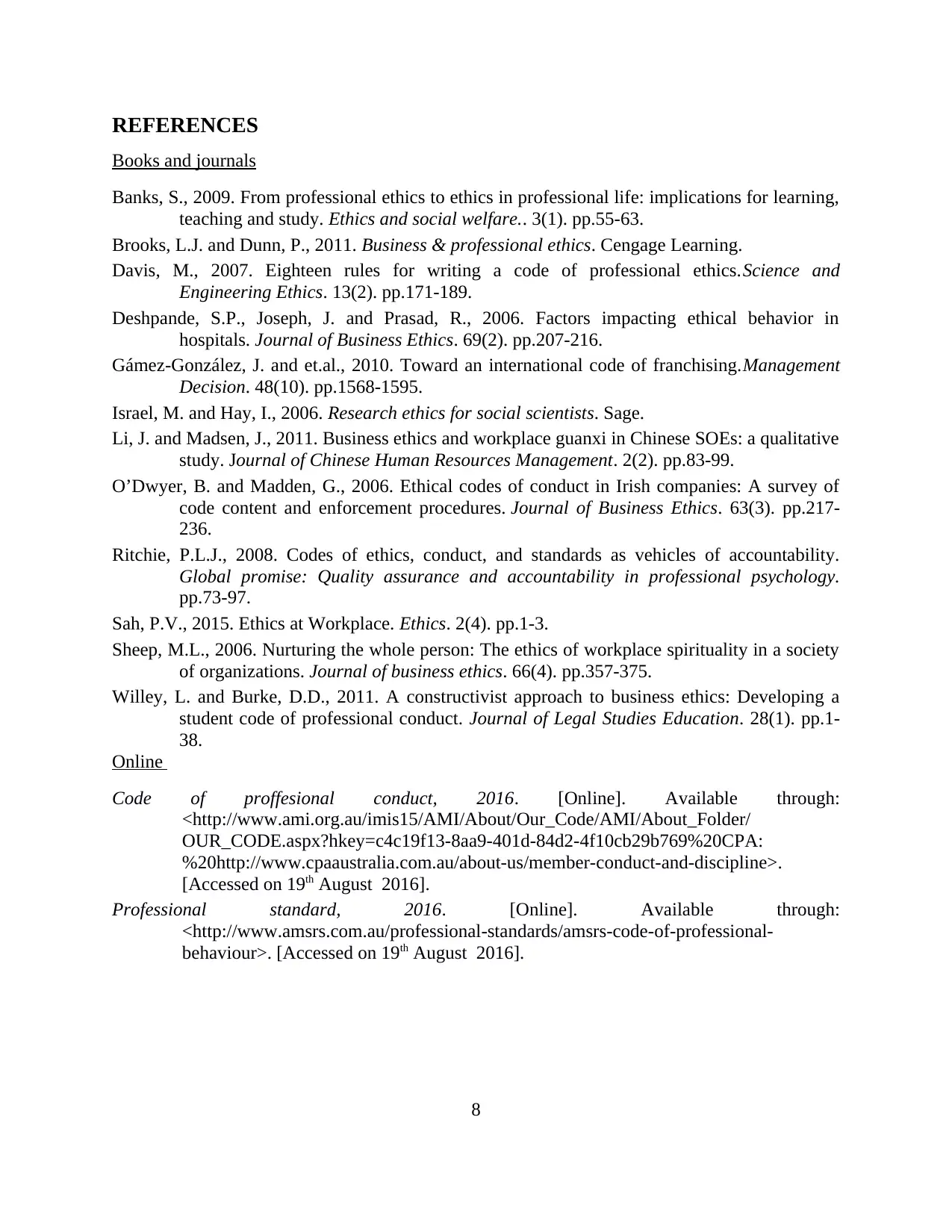
REFERENCES
Books and journals
Banks, S., 2009. From professional ethics to ethics in professional life: implications for learning,
teaching and study. Ethics and social welfare.. 3(1). pp.55-63.
Brooks, L.J. and Dunn, P., 2011. Business & professional ethics. Cengage Learning.
Davis, M., 2007. Eighteen rules for writing a code of professional ethics.Science and
Engineering Ethics. 13(2). pp.171-189.
Deshpande, S.P., Joseph, J. and Prasad, R., 2006. Factors impacting ethical behavior in
hospitals. Journal of Business Ethics. 69(2). pp.207-216.
Gámez-González, J. and et.al., 2010. Toward an international code of franchising.Management
Decision. 48(10). pp.1568-1595.
Israel, M. and Hay, I., 2006. Research ethics for social scientists. Sage.
Li, J. and Madsen, J., 2011. Business ethics and workplace guanxi in Chinese SOEs: a qualitative
study. Journal of Chinese Human Resources Management. 2(2). pp.83-99.
O’Dwyer, B. and Madden, G., 2006. Ethical codes of conduct in Irish companies: A survey of
code content and enforcement procedures. Journal of Business Ethics. 63(3). pp.217-
236.
Ritchie, P.L.J., 2008. Codes of ethics, conduct, and standards as vehicles of accountability.
Global promise: Quality assurance and accountability in professional psychology.
pp.73-97.
Sah, P.V., 2015. Ethics at Workplace. Ethics. 2(4). pp.1-3.
Sheep, M.L., 2006. Nurturing the whole person: The ethics of workplace spirituality in a society
of organizations. Journal of business ethics. 66(4). pp.357-375.
Willey, L. and Burke, D.D., 2011. A constructivist approach to business ethics: Developing a
student code of professional conduct. Journal of Legal Studies Education. 28(1). pp.1-
38.
Online
Code of proffesional conduct, 2016. [Online]. Available through:
<http://www.ami.org.au/imis15/AMI/About/Our_Code/AMI/About_Folder/
OUR_CODE.aspx?hkey=c4c19f13-8aa9-401d-84d2-4f10cb29b769%20CPA:
%20http://www.cpaaustralia.com.au/about-us/member-conduct-and-discipline>.
[Accessed on 19th August 2016].
Professional standard, 2016. [Online]. Available through:
<http://www.amsrs.com.au/professional-standards/amsrs-code-of-professional-
behaviour>. [Accessed on 19th August 2016].
8
Books and journals
Banks, S., 2009. From professional ethics to ethics in professional life: implications for learning,
teaching and study. Ethics and social welfare.. 3(1). pp.55-63.
Brooks, L.J. and Dunn, P., 2011. Business & professional ethics. Cengage Learning.
Davis, M., 2007. Eighteen rules for writing a code of professional ethics.Science and
Engineering Ethics. 13(2). pp.171-189.
Deshpande, S.P., Joseph, J. and Prasad, R., 2006. Factors impacting ethical behavior in
hospitals. Journal of Business Ethics. 69(2). pp.207-216.
Gámez-González, J. and et.al., 2010. Toward an international code of franchising.Management
Decision. 48(10). pp.1568-1595.
Israel, M. and Hay, I., 2006. Research ethics for social scientists. Sage.
Li, J. and Madsen, J., 2011. Business ethics and workplace guanxi in Chinese SOEs: a qualitative
study. Journal of Chinese Human Resources Management. 2(2). pp.83-99.
O’Dwyer, B. and Madden, G., 2006. Ethical codes of conduct in Irish companies: A survey of
code content and enforcement procedures. Journal of Business Ethics. 63(3). pp.217-
236.
Ritchie, P.L.J., 2008. Codes of ethics, conduct, and standards as vehicles of accountability.
Global promise: Quality assurance and accountability in professional psychology.
pp.73-97.
Sah, P.V., 2015. Ethics at Workplace. Ethics. 2(4). pp.1-3.
Sheep, M.L., 2006. Nurturing the whole person: The ethics of workplace spirituality in a society
of organizations. Journal of business ethics. 66(4). pp.357-375.
Willey, L. and Burke, D.D., 2011. A constructivist approach to business ethics: Developing a
student code of professional conduct. Journal of Legal Studies Education. 28(1). pp.1-
38.
Online
Code of proffesional conduct, 2016. [Online]. Available through:
<http://www.ami.org.au/imis15/AMI/About/Our_Code/AMI/About_Folder/
OUR_CODE.aspx?hkey=c4c19f13-8aa9-401d-84d2-4f10cb29b769%20CPA:
%20http://www.cpaaustralia.com.au/about-us/member-conduct-and-discipline>.
[Accessed on 19th August 2016].
Professional standard, 2016. [Online]. Available through:
<http://www.amsrs.com.au/professional-standards/amsrs-code-of-professional-
behaviour>. [Accessed on 19th August 2016].
8
1 out of 8
Related Documents
Your All-in-One AI-Powered Toolkit for Academic Success.
+13062052269
info@desklib.com
Available 24*7 on WhatsApp / Email
![[object Object]](/_next/static/media/star-bottom.7253800d.svg)
Unlock your academic potential
Copyright © 2020–2026 A2Z Services. All Rights Reserved. Developed and managed by ZUCOL.





